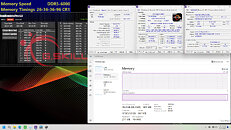
MSI Releases AMD AGESA 1.2.0.3e BIOS, Supporting 4x 64 GB Memory Configs and Upcoming CPUs
MSI has released the latest AMD AGESA ComboPI-1.2.0.3e BIOS, supporting all AMD AM5 models, including X870, B850, B840, X670, B650, and A620 chipsets. This update not only adds support for upcoming new CPUs, but also enables all AM5 motherboards to support large-capacity 64 GB x4 DRAM chips. MSI motherboards have been optimized for overclocking large-capacity DRAM—compatible with DRAM chips from Micron, Hynix, and Samsung. Even with four 64 GB DRAM fully installed, the system can still achieve a stable overclocking speed of 6000 MT/s, and even up to 6400 MT/s.
In addition, this update optimizes 2DPC 1R capability and includes overclocking enhancements specifically for Samsung's 4Gx8 chips. AGESA 1.2.0.3e has already been rolled out to selected AM5 800 series models, users are able to find the updated BIOS on the MSI website, and MSI will continue to update the remaining AM5 models as soon as possible. Get ready to enjoy the powerful performance brought by memory overclocking!
In addition, this update optimizes 2DPC 1R capability and includes overclocking enhancements specifically for Samsung's 4Gx8 chips. AGESA 1.2.0.3e has already been rolled out to selected AM5 800 series models, users are able to find the updated BIOS on the MSI website, and MSI will continue to update the remaining AM5 models as soon as possible. Get ready to enjoy the powerful performance brought by memory overclocking!















































































